#DETERMINISM
Text
"I hear that goblins believe that the railway engines have a soul, elf," she said softly. "Tell me, what kind of soul have you? Do you run along your own elvish rails? With no time or place for turning?" She looked at the kelda and said, "Granny Aching told me to feed them that was starving and clothe them as is naked and help the pitiful. Well, this elf has come to my turf--starving, naked pitiful--do you see?"
The kelda's eyebrows rose. "Yon creature is an elf! It has nae care for ye! It has nae care for anyone--it disnae even care for other elves!"
"You think then there is no such animal as a good elf?"
"Ye think there is such a thing as a gud elf?"
"No, but I am suggesting that there is a possibility that there might be one."
Terry Prachett, The Shepherd's Crown
#tiffany aching#the kelda#nightshade#granny aching#iron girder#the shepherd's crown#discworld#terry pratchett#identity#souls#change#development#character development#responsibility#determinism#prejudice#stereotypes#expectations#empathy#compassion#fairies#elfs#goblins#feegles#witches#possibility#no such thing#help the pitiful#what kind of soul have you
137 notes
·
View notes
Quote
If you are going to tell me what you predict I will do, then your prediction must take into account the effect on me of knowing your prediction, because otherwise it will probably be wrong. Of course it can happen, in a specific kind of case, that knowing the sort of thing I am usually determined to do diminishes my freedom. If I see that I often give in to temptation, I might become discouraged, and fight against it even less hard. But there is no reason to think that this kind of discouragement would be the general result of understanding ourselves better. Or if there is, it must come from some pessimistic philosophy of human nature, not from the Scientific World View. If predictions can warn us when our self-control is about to fail, then they are far more likely to increase that self-control than to diminish it. Determinism is no threat to freedom.
Christine M. Korsgaard, The Sources of Normativity
#philosophy#quotes#Christine M. Korsgaard#The Sources of Normativity#freedom#will#free will#control#prediction#determinism
48 notes
·
View notes
Quote
Be determined.You can make it in life.You can make all your dreams come true.
Lailah Gifty Akita
#quotes#Lailah Gifty Akita#thepersonalwords#literature#life quotes#prose#lit#spilled ink#belief-in-self#believe-and-achieve#believe-in-god#believe-in-yourself#determination#determine#determined#determined-person#determined-spirit#determinism#dream#dream-big#dreamer#dreamers#dreamers-versus-reasoners#dreaming#dreams#dreams-come-true#dreams-quotes#insight#insightful#insightful-quote
36 notes
·
View notes
Text

[ID: Illustration from a children's book showing a man with a walking stick talking to am older man with bare feet and tattered clothes. Text reads "As you journey along the path you meet an old man. He tells you that modern neuroscience has proved that all our actions and decisions are merely the machinations of a predetermined universe and that our concept of 'free will' is naught but a comforting illusion. If you agree with his hypothesis, turn to page 72 If you disagree, turn to page 72"]
97 notes
·
View notes
Text
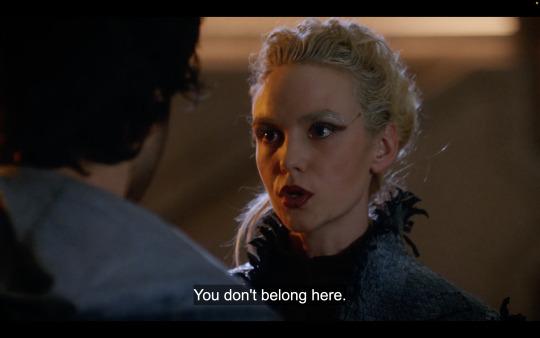



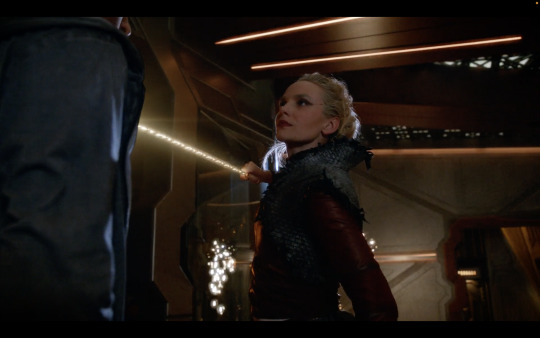

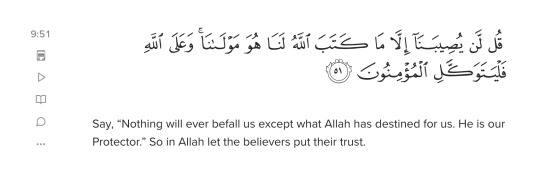


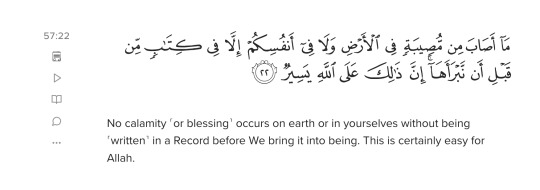
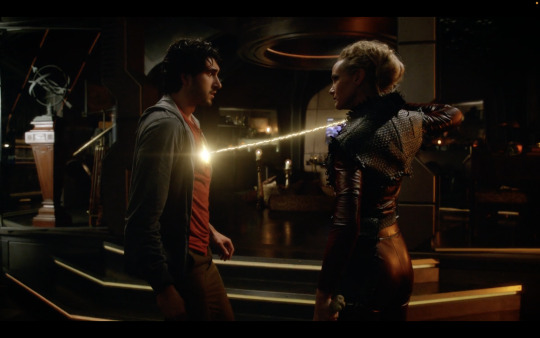



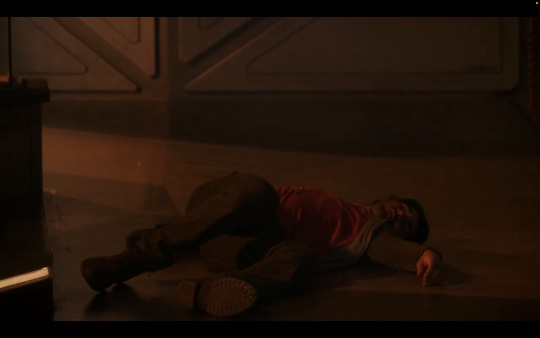
"...she's not meant to be part of your world again!... It's not supposed to happen!... It's unwritten. It can all be undone. The forgotten do not remember what does not happen."
DC's Legends of Tomorrow (2016-2022) // The Mountain Goats, "Only One Way" // King Falls AM // The Qur'an, 9:51 // The Mountain Goats, “White Cedar” // The Qur'an, 57:22 // Antonin Artaud, from The Theater of Cruelty // Sylvia Plath, from Lady Lazarus
#something possessed me to make this#so it might make zero sense#dcs legends of tomorrow#legends of tomorrow#legends of tomorrow 5x09#zari not zari#behrad tarazi#arrowverse#web weaving#i guess#determinism#5x09#behrad tomaz#or whatever the fuck#zari tarazi#zari tomaz
26 notes
·
View notes
Text
Oh god I'm starting to realize the links between determinism and western imperialism. Is all of philosophy like this?
#196#my thougts#philosophy#anticapitalist#anti capitalist#anti colonialism#anti capitalism#anti christianity#anachism#determinism#postmodernism
22 notes
·
View notes
Text
Whatever happens to you has been waiting to happen since the beginning of time. The twining strands of fate wove both of them together: your own existence and the things that happen to you.
— Marcus Aurelius
#life quotes#lifequotes#light#quote#quote of the day#quoteoftheday#quotes#wisdom#marcus aurelius#fate#kismet#will of god#destiny#time#existence#events#experience#human nature#humankind#mankind#humanity#freewill vs predetermination#predetermination#determinism#fortune#chance#predestination
9 notes
·
View notes
Text
LOST IN TRANSLATION
To say that free will is reducible to physics is to say that writing is reducible to spelling: you're not laying bare a truth so much as forcing one reality into another — and losing a lot along the way.
9 notes
·
View notes
Text
Free Will vs Determinism
In the grand theater of philosophical discourse, the debate between free will and determinism has persisted through the ages, each side presenting compelling arguments in defense of its position. Yet, upon closer examination, it becomes evident that the notion of free will withstands scrutiny, even in the face of formidable counterarguments.
Detractors of free will often assert that our actions are governed by a complex interplay of genetic predispositions, environmental influences, and neurological processes—a deterministic framework that seemingly leaves no room for genuine autonomy. They point to studies in neuroscience that suggest our decisions are prefigured by neural activity milliseconds before we consciously perceive them, implying that our sense of agency is illusory.
However, this deterministic perspective fails to account for the multifaceted nature of human consciousness. While it is true that our biology and environment shape our perceptions and predispositions, it does not follow that they entirely determine our choices. Rather, they provide the context within which our capacity for free will operates—a canvas upon which we paint the strokes of our decisions.
Furthermore, the very act of deliberation, of weighing options and considering consequences, speaks to the reality of our agency. While our subconscious may influence our thoughts and behaviors, it is our conscious awareness that ultimately guides our actions. In this sense, free will emerges not as a force divorced from causality but as a dynamic interplay between our internal desires and external constraints.
Moreover, the existence of moral responsibility presupposes the existence of free will. If our actions were wholly determined by external factors, then notions of praise, blame, and accountability would lose their meaning. Yet, in our everyday interactions, we hold individuals accountable for their choices, recognizing the fundamental freedom inherent in moral agency.
In conclusion, while determinism presents a compelling framework for understanding the mechanics of causality, it falls short in capturing the full breadth of human experience. Free will, far from being an illusion, serves as the cornerstone of our moral and existential significance—a beacon of autonomy in the vast expanse of existence. Thus, in the eternal quest for truth and understanding, let us embrace the profound reality of our capacity to choose, to shape our destinies, and to navigate our own paths through the currents of time.
#original post#free will#philosophy#writers on tumblr#spilled writing#spilled thoughts#spilled in writing#spilled ink#let’s talk#debate#determinism#illusion#thoughts#words#philosophical#open minded
12 notes
·
View notes
Text

Μέμνησο, ὅτι ὑποκριτὴς εἶ δράματος, οἵου ἂν θέλῃ ὁ διδάσκαλος
Epictetus
Remember that you are an actor in a drama, whatever kind the playwright desires.
#epicteus#greek#classical#quote#redhead#fate#drama#players on a stage#determinism#predictable#femme#beauty
52 notes
·
View notes
Text
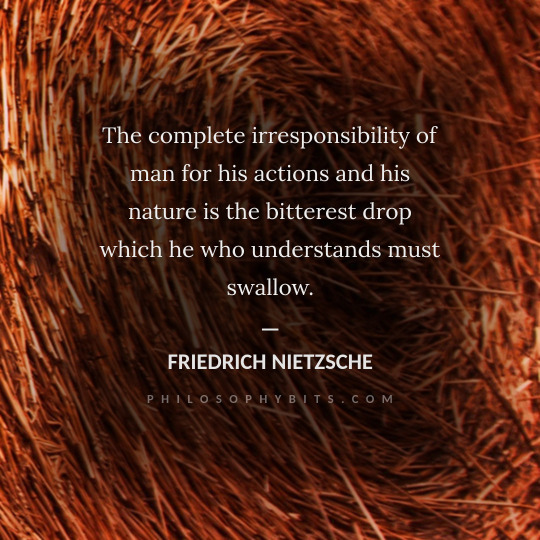
#philosophy#quotes#Friedrich Nietzsche#Human All Too Human#Nietzsche#actions#responsibility#free will#determinism#causality#desert#merit
12 notes
·
View notes
Text
Hot take here but the overwhelming majority of morality is just social trends influenced by the ebb and flow of innumerable sociopolitical forces outside of anyone's actual control and the vast majority of ethical beliefs held by any given individual have nothing to do with genuine independent thought on their part and are simply emblematic of how that individual happens to be influenced by said trends and forces. Causality and natural laws determine the flow of human thought and behavior just as much as they do the flow of water, because humans are a part of nature. Also we are never going to gain collective enlightenment, because humans are not neurons in an ancient brain and we do not, when considered as a collective, literally constitute a singular being who learns and grows over time. Humans today are the same kind of beings as humans from 50,000 years ago, and humanity cannot ever meaningfully change because it is human nature and not ideology that ultimately determines how we think and behave as a species, and all ideology is ultimately both a product of and subject to this nature. And we cannot make concrete philosophical progress in the same sense that we make scientific progress, because philosphical truth and morality and ideas are not objective properties of reality, and all it takes to "unlearn" a philosophical belief is to have a reason, even an entirely subconscious reason, to not want to believe it, whereas something like how a light bulb works is true whether you want to believe it or not, and people (most of the time) do not have any psychological motivation to abandon scientific claims and observations. There is a reason why history repeats itself and progress backslides and problems that have plagued humanity for at least as long as recorded history continue to do so, and why issues just come right back in new forms whenever they are meaningfully addressed, and why they are so rarely ever meaningfully addressed in the first place, and why you can see certain types of oppression and depravity everywhere in the world no matter where you go. Humans are humans and will always be humans. And yes, that fact is incredibly depressing and disheartening, and yes it does mean that having genuine faith in the idea of "progress" is misguided.
#random thoughts#rant#vent#philosophy#human nature#morality#progress#politics#determinism#causality#hot take#unpopular take#unpopular opinion
23 notes
·
View notes
Quote
Whatever concept one may hold, from a metaphysical point of view, concerning the freedom of the will, certainly its appearances, which are human actions, like every other natural event are determined by universal laws.
Immanuel Kant, Idea for a Universal History with a Cosmopolitan Purpose
#philosophy#quotes#Immanuel Kant#Idea for a Universal History with a Cosmopolitan Purpose#causes#causality#appearances#free will#metaphysics#determinism
65 notes
·
View notes
Text
Nature is not your friend.
Nature is a not a force of benevolence. It does not think, it does not feel, it does not want. It is incapable of caring about the wellbeing of any living creature. It is not inherently good. An inherently good thing would necessarily either be inherently good in character, which nature cannot be because it is not a conscious being, or inherently good in what it does, the effects it has on the world, which nature is clearly not.
The evils born from human action are not separate from nature. They are a part of nature. They are examples of how the evils of nature manifest. Humans do not exist outside of nature. We are just as much a part and product of it as any other creature, as objects even, as water and the moon. And while nature is not a conscious thing, it can and does cause immeasurable harm. It is evil because of this harm caused. Not in the way a man is evil, but in the way cancer is evil, in the way an earthquake taking hundreds of lives and leaving people trapped, injured, and starving for days is evil. Not evil as in a being who is morally corrupt, but evil as in a thing which generates injustice. A child who suffers the fate of dying horribly from disease is a victim of evil just as much as a child who is poisoned by another human is a victim of evil. True evil is in the experiencing of injustice, not in the deliberate creation of it. A victim of evil is created when a being is made to suffer. The nature of the perpetrator, what blame, of what kind, and to what extent, can be placed on it, is irrelevant. A victim is a victim whether they understand why they were harmed or not, whether they hate that which harmed them or not, whether they judge it or not, whether it can be held accountable or not, their pain is just as real and their suffering is just as unjust, just as wrong, just as unfair, just as undeserved, just as cruel, just as evil.
Whatever hate you hold in your heart for humanity, hold it too for nature, who imbued humanity with both the ability to experience harm and the ability to inflict it. Who gave humanity its impulses, its urges, its instincts, prejudices, and perversions. Whatever sympathy you feel for animals who are made to suffer through human action, feel it too for the animals who suffer independently of the influence of humanity, who succumb to torturous diseases, broken limbs and open wounds, tape worms and bot flies, and deformities which render them incompatible with survival from their very birth.
To detest evil is to detest nature itself. To love nature is to dismiss its evils as not truly evil, to dismiss suffering as not truly unjust. To love goodness is to love happiness, joy, and pleasure, to love what of these things can be felt, created, spread, and preserved. But there is no loving of goodness in the love of nature. If nature can be, and often is, seen as good through the good it births, regardless of its status as a mere force, then it can be seen as evil through its creation of evil as well. And just as we would not consider a person who committed uncountable horrible acts to be redeemable through any number of good ones, we should not see the good that nature creates as capable of excusing or justifying its innumerable works of evil, which include amongst them all the evils of humanity.
#antinatalism#efilism#pessimism#anti suffering#negative utilitarianism#determinism#rant#rambling#I know I sound kind of pretentious here I'm sorry this is just how I write#luna's
45 notes
·
View notes
Photo
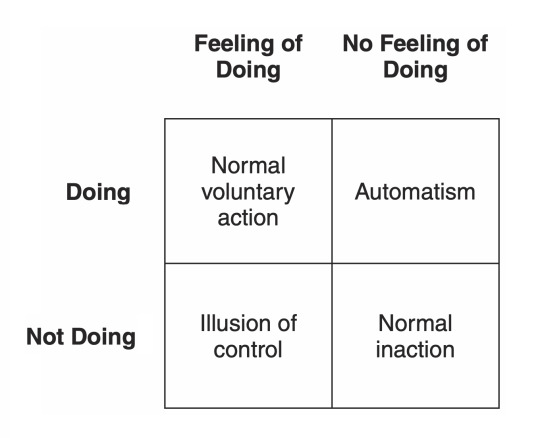
The four basic conditions of human action— the combinations that arise when we emphasize the distinction between action and the sense of acting willfully.
Daniel Wegner, The Illusion of Conscious Will
376 notes
·
View notes
Text
The Power of Dune Part Two’s Final Act: Stepping Away From the Messiah
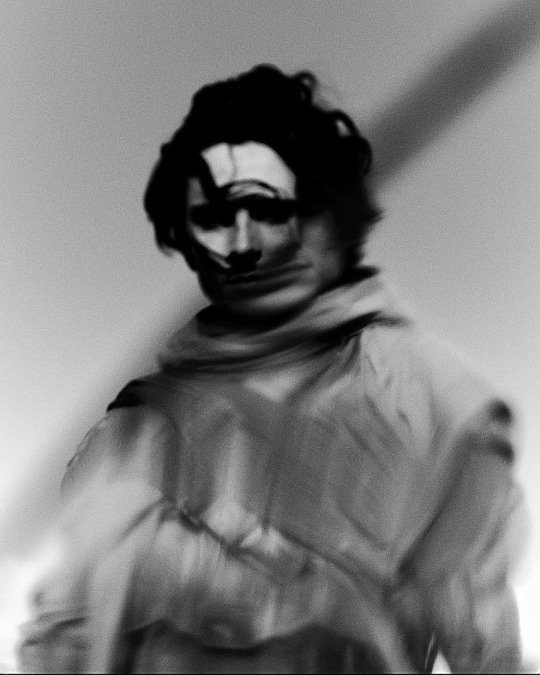
Stunning photo by Jack Davidson
So I didn't think I would be talking about Dune in my first post for this page (considering that I intended it to be more Star Wars focused and also since I haven't read the Dune books yet), but the final stretch of this movie has been on my mind ever since I left the theater a few weeks ago.
(Spoilers for Dune: Part Two)
It's strange in the sense that we are suddenly distanced from Paul, and also in that the climax seems to accelerate the story faster than ever before. So far (in both movies), there has been a pretty strong focus on Paul and a very deliberate pace that let all the plotlines simmer. It’s a masterclass of immersion, both technically and emotionally. The humanity of its characters aren’t lost in the many elements at play. Paul is a character whose empathy and how it makes him conflicted with what is placed before him make him quite likable. Spending so much time with him, Chani, and Stilgar makes us grow attached to them, not just because they’re the heroes, but because they feel real. And yet we’re pushed away. In the third act Paul's dark transformation happens swiftly (you’d initially think from how it’s shown the water of life turns you evil), and by the story’s end we only see Paul from a distance in the eyes of other characters, unable to see him resolving the concerns we’ve wrestled along with him, unable to get a good read on his motivations anymore. The final battles with our heroes happen rather quickly as victory over the Harkonnans and the Emperor comes pretty easily. On one hand this shift could feel unsatisfying, and the first time I watched the movie I was a little unsatisfied. But I’m not here to say this is a fault of the movie; in fact, this shift results in something greater happening, and it’s the most powerful triumph of Part Two’s story.

By the end, even when we do zoom in on Paul we're not sure what's really behind his intensity. (All the Dune screencaps are from Dune Perfect Shots 4K on Twitter).
Dune’s story up until this point, from what I know about these two films at least, is all about complexity, discerning the many variables, the need to carefully monitor both these variables and one's own behavior. The importance of mastering oneself. (This video by Alt Shift X talks about this really well, and it definitely helped me understand this aspect of the story better). But Paul’s tests, like the Gom Jabbar in Part 1 and the worm ride in Part 2, carry not just that significance but also the danger of a prophetic horror being more and more certain. Therein lies an irony - you can gain power but tied to it is something much larger that’s out of your control. This becomes pretty key to the whole story, and there’s something I was reminded of that helped me put all this into perspective. I brought this up in my first-time watch review too, but I think I have more to say about it now. But bare with me as this might end up being convoluted.

In one of my classes this semester we read the poem “The Promised Land” by Gabeba Baderoon, and I was really struck by this image that it alludes to called the Angel of History. Described by Walter Benjamin based on the painting Angelus Novus by Paul Klee, it depicts an angel whose wings get caught in the winds of a destructive storm “blowing from Paradise.” It’s trapped in the storm’s momentum going forwards with no way to escape. All the while, its head is permanently twisted backwards, forced to watch the wreckage of the storm, named progress, gathering below it. From what we discussed in that class this disturbing image suggests that all the events of history, all that we do or achieve or create, is not a series of events affecting each other, but instead one ever-building catastrophe barreling forwards. Both the Bene Gesserit’s century-spanning machinations and Jessica’s usurping of it all by birthing a boy. Whether the Harkonnen house or the Atreides house controls Arrakis. All of these are merely before a future that’s larger than any of them individually; the messiah and his holy war will come regardless. Even if it’s towards her own end rather than that of the Bene Gesserit, Jessica still uses their propaganda to facilitate his rise. The two houses end up converging anyways in their family trees with the Baron, and Muad’dib Atreides embraces it, merging the two families’ ideologies like the Kwizatz Haderach was always intended to. Whether his sudden ruthlessness is him embracing his desire for revenge or actually a strategic choice after sifting through the past and futures laid out, we’re denied of knowing for sure as we look at him from afar, and this denial by the film questions if the answer even matters much. The Angel image and the movie’s narrative dispel the idea that we have the capability to easily fix things when we make progress. It’s a notion that renders reasoning or means as having little ability to empower, envisioning us all moving towards the same horror anyways. It suddenly renders all the complexity of the plot and these competing ideas and factions inconsequential. And I don’t mean that in a bad way — it’s crucial to what the film is really getting at.

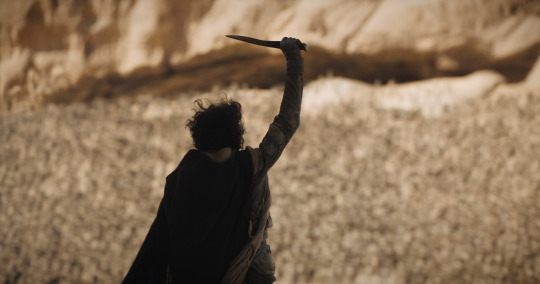
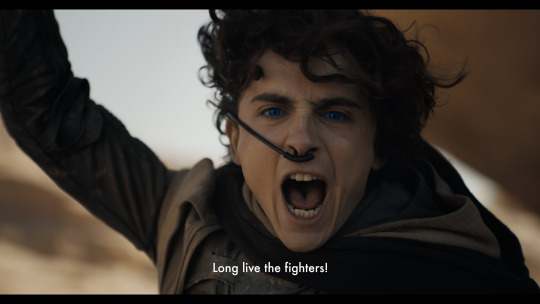
"We're Harkonnens... so that's how we'll survive. By being Harkonnens."

“You of all people should know there are no sides, Reverend Mother.”
Now, it’s fair to question the nihilistic bent of this (are we in the real world truly powerless to stop to this continuous catastrophe???), but the Angel of History and Dune use the stories they put forth as cautionary tales where that all-encompassing bleak endgame are meant to deconstruct our notions of progress and control. If we are powerless to shape history, how strong is the power we wield? And how good is the power we wield? As we strive for “paradise” and celebrate attaining it we often forget what happened as we got there, and we fail to see where we really are. If the reasoning for our actions doesn’t empower us, the effects of them in turn are even more debasing. The Baderoon poem that alludes to the Angel of History does so to examine this too. In its discussion of the end of apartheid and the ushering in of a democratic South Africa, “The Promised Land” weaves in the legacy of the jazz pianist Moses Molekelwa, who, despite influencing the poem’s speaker’s attitudes towards social progress (and appearing as an idol in that sense), is shown as getting off the hook in the eyes of history for strangling his wife to death. The triumph of his music is remembered while his wife’s murder is willfully forgotten, and the poem concludes that “our forgetting is also our home, which is why we will never leave the old country.” Baderoon warns of when the celebration of progress doesn’t factor in the ugly parts we still carry with us into the future, and her allusion to the Angel of History works to convey that danger. (Obviously the real anti-apartheid struggle of South Africa is very very different from the story of Dune, and I wouldn’t want to compare them to each other. Dune’s exploration of complicated progress instead speaks more towards the dangers of charismatic leaders and the co-opting of a cause). The only thing I want to highlight is just that Dune, Baderoon’s poem, and the Angel of History all hone in on the need to not lose sight of the now.


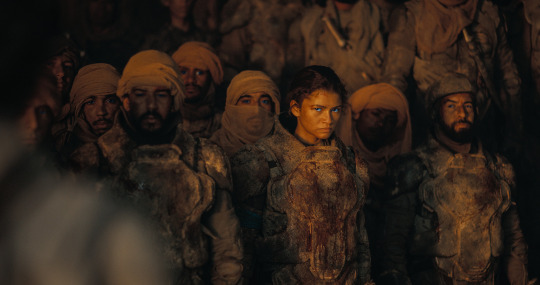
This is why the third act’s shift away from Paul works so well. The film doesn’t show people “forgetting” necessarily, but we do see them caught in the fervor without acknowledging what’s happening to them. Paul is an exception in that he sees it all: his arc sees him changing his perspective on the destiny laid ahead and taking control to ensure it happens on his terms. He doesn’t really turn evil, but since we’re denied of seeing past his new icy exterior as he looks ahead with his prescience, the film instead turns us back to the now, like the angel looking behind. We're with Chani now, the only (non-psychic) person who’s seeing this all. We already believe in Paul’s goodness. If we were to see what Paul sees and fully understand his reasoning, it would make it easy for us to downplay the costs. The story thus has us focus on the consequences of Paul’s path beginning to gather in real time, the Fremen being exploited as they are led into a coming bloodbath by their messiah.
And this is the sadness of it all, right? Things that were once honorable, like Jessica protecting Paul like she promised Leto and the legacy of Leto that Gurney hopes for Paul to carry with him, are twisted into foul and manipulative actions. Good intentions and real connections, like Paul’s empathy, his and Chani’s relationship, and his and Stilgar’s friendship, all give way to the storm.
The quickness of the third act’s events compounds this danger. The path Paul takes may be the best possible option after considering all the variables, but the story doesn’t revel too long in the glory of his successful leadership and strategy.

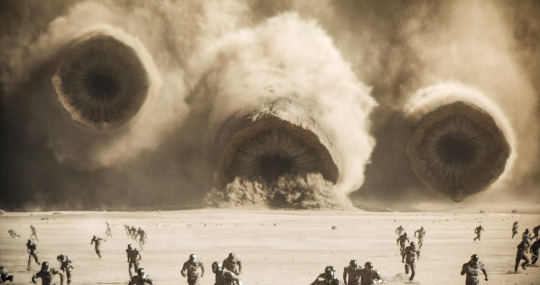
The awe-inspiring images speak not to just heroism but something volatile and intoxicating. It's not that the film oversimplifies the moral dilemmas at stake, but by letting the big battle, Gurney slaying Rabban, and Paul slaying the Baron happen all too easily, it removes the focus from only being the powerful exploits of Paul and the Fremen and adds emphasis on how they become like Harkonnens and how the Fremen become entrenched in Paul’s conquest. The Harkonnen bodies are burned like the Atreides were before them, and the Fremen Fedaykin ultimately fight carrying the Atreides banner instead of their own. They lose sight of this fact as they place all their faith in Paul, their cause and faith co-opted. It happens so fast and it can’t be stopped. We’re caught in the momentum of the storm raging, pushing us forward, and at the same time the film adjusts its focus to ensure that we don’t forget to recognize the consequences of Paul’s choices. This is what I find so compelling about this movie — we’re given a story that details the complexity of all things and also ultimately denies complicated factors and necessary evils of becoming excuses that wave the wreckage of progress away.
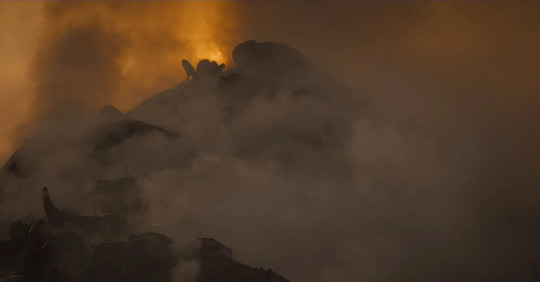
Hopefully this was enjoyable to read and wasn't pretentious or anything! Lemme know what you think about the movie!
#dune#long post#dune part two#dune movie#dune 2#dune part 2#dune 2024#paul atreides#kwisatz haderach#lisan al gaib#angelus novus#angel of history#determinism#frank herbert#denis villeneuve#gabeba baderoon#movies#movie review#movie discussion#movie analysis#film#film analysis#film discussion#media analysis#favorite movies#letterboxd#cinema#movie stills#movie photography#movie adaptation
6 notes
·
View notes